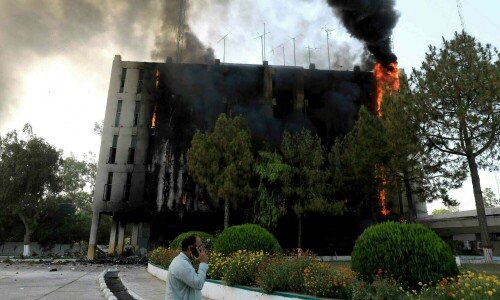Four APS terrorists executed in Kohat

ISLAMABAD: Four terrorists involved in the Army Public School attack last year were hanged at a civil jail in Kohat on Wednesday.
The hangings were the first executions of civilians convicted by Pakistan's military courts.
A security source confirmed the execution of the four terrorists saying, “Four militants involved in the attack on Army Public School were hanged this morning in Kohat prison.”
The executions were confirmed by a prison official, who said the militants had held a final meeting with their families on Tuesday night, reported AFP.
The executions come as the country prepares to observe the first anniversary of the attack on Dec 16.
The army chief had signed the black warrants of Maulvi Abdus Salam, Hazrat Ali, Mujeebur Rehman and Sabeel alias Yahya on Monday.
The mercy appeals of the terrorists were rejected by President Mamnoon Hussain.
Militants stormed the school on Dec 16, 2014, killing at least 144 people ─ most of whom were children.
In the wake of the APS carnage, military courts were set up for trying terrorists under amendments made to the Constitution and the Army Act.
This was the first sentence approved by the army chief following the Supreme Court's August 2015 judgement giving legal cover to the establishment of military courts.
The ISPR had earlier released the following details of the convicts and the crimes for which they were sentenced:
Civilian Molvi Abdus Salam s/o Shamshi
The convict was an active member of Toheedwal Jihad Group (TWJ). He was found involved in harbouring suicide bombers, later used in the attack on the Army Public School, Peshawar, which resulted in the deaths of 151 persons including 125 children and injuries to 147 persons and damage to govt property. He was also involved in abetting deaths of two colonels and a civilian, Director of National Development Complex (NDC). He confessed to his offences before the magistrate and the trial court. He was tried on four charges and awarded the death sentence.
Civilian Hazrat Ali s/o Awal Baz
The convict was an active member of Toheedwal Jihad Group (TWJ). He was found involved in attacking law enforcement agencies, abetting kidnapping and killing of Levies soldiers and collecting funds for attack on Army Public School, Peshawar. He was also involved in killing 23 Levies soldiers. He admitted his offences before the magistrate and the trial court. He was tried on five charges and awarded the death sentence.
Civilian Mujeebur Rehman alias Ali alias NajeebUllah s/o Ghulab Jan
The convict was an active member of Toheedwal Jihad Group (TWJ). He was found involved in transporting 10 suicide bombers for the attack on Pakistan Air Force Base Peshawar. He was also involved in attacks on law enforcement agencies and abetment in the attack on the Army Public School, Peshawar, which resulted in the deaths of 151 persons including 125 children, injuries to 147 persons and damage to govt property. He admitted his offences before the magistrate and the trial court. He was tried on three charges and awarded the death sentence.
Civilian Sabeel alias Yahya s/o Atta Ullah
The convict was an active member of Toheedwal Jihad Group (TWJ). He was found involved in the attack on Pakistan Air Force Base, Peshawar; a Police check post, transportation of 10 suicide bombers and abetment in the attack on Army Public School, Peshawar, which resulted in the deaths of 151 persons including 125 children and injuries to 147 persons. He admitted his offences before the magistrate and the trial court. He was tried on three charges and awarded the death sentence.
Military courts
Political parties had unanimously agreed over the issue of setting up military courts to tackle terrorism cases in the country following the gruesome attack on the Army Public School in Peshawar in December 2014, following which the Parliament passed the 21st constitutional amendment in Jan 2015 to set up the said courts.
President Mamnoon Hussain had also promulgated an ordinance further revising the recently amended Army Act to ostensibly aid the functioning of military courts by allowing for trials in camera, i.e without the presence of the public or the media, and over video link if necessary.
The Supreme Court in a majority ruling upheld the establishment of military courts in Pakistan.
Explore: Military courts: a wrong move
Petitions challenging the 21st amendment were dismissed in August this year in a majority 11-6 vote of the 17-member SC bench. Chief Justice Nasirul Mulk and Justice Dost Muhammad announced the verdict.
In a 14-3 majority vote, petitions challenging the 18th amendment were also dismissed by the bench. Judges provided seven opinions and two additional notes on the ruling.
144STORIES: Visit the Army Public School Memorial














































